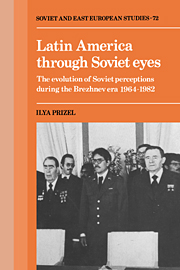 Latin America through Soviet Eyes
Latin America through Soviet Eyes Published online by Cambridge University Press: 05 February 2012
Mexico was the first Latin American country, and indeed one of the first countries in the world, to recognize the Bolshevik regime. Mexico and Russia emerged at about the same time from their respective revolutions, both of which were directed in large measure against the existing world order, and thus it was natural that the two countries felt sympathy for each other. Moreover, Lenin saw in Mexico a potential counterweight to the expansion of the United States, the most powerful member of the imperialist bloc, while the Mexican government of President Carranza hoped that Russia's anti-imperialist policy would constrain future US interventions in Mexico.
The apex of Soviet–Mexican relations was reached during the mid-1920s, when Alexandra Kollanti was appointed ambassador to Mexico. Relations deteriorated in 1930, when Mexico first alleged that the Soviet embassy had aided a Comintern-directed uprising in Veracruz province and then broke its diplomatic ties with the USSR. Relations remained poor during the Spanish civil war, despite the fact that Mexico and the USSR were the only countries to support the Republican side openly. This was due to Mexico's having granted refuge to Trotsky and its bitter criticism of the Molotov–Ribbentrop Pact of 1939.
Soviet–Mexican ties, renewed in 1942, remained minimal, even though Mexico and Argentina were the only Latin American countries to defy US pressure during the cold war and to refuse to sever ties with the USSR.
To save this book to your Kindle, first ensure no-reply@cambridge.org is added to your Approved Personal Document E-mail List under your Personal Document Settings on the Manage Your Content and Devices page of your Amazon account. Then enter the ‘name’ part of your Kindle email address below. Find out more about saving to your Kindle.
Note you can select to save to either the @free.kindle.com or @kindle.com variations. ‘@free.kindle.com’ emails are free but can only be saved to your device when it is connected to wi-fi. ‘@kindle.com’ emails can be delivered even when you are not connected to wi-fi, but note that service fees apply.
Find out more about the Kindle Personal Document Service.
To save content items to your account, please confirm that you agree to abide by our usage policies. If this is the first time you use this feature, you will be asked to authorise Cambridge Core to connect with your account. Find out more about saving content to Dropbox.
To save content items to your account, please confirm that you agree to abide by our usage policies. If this is the first time you use this feature, you will be asked to authorise Cambridge Core to connect with your account. Find out more about saving content to Google Drive.